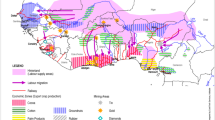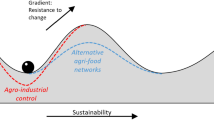Abstract
In 1984, William Friedland proposed a Commodity Systems Analysis framework for describing the stages through which a commodity is transformed and how it acquires value. He challenged us to think of commodities as entities with a social as well as a physical presence. Friedland's argument enriched the concept of commodity production, but it remains essentially a supply side perspective.
Since then, many commentators have argued that power is shifting from producers to consumers. Furthermore, some are claiming that, contrary to much traditional Marxist thinking about how individuals find meaning through their productive capacities, it is now through consumption that individuals are identifying themselves. Given the significance of this view, it seems timely to extend Friedland's framework to incorporate the consumption perspective.
In light of other claims that the distance between production and consumption is increasing, it is equally important to acknowledge the processes that structure the relationship between the two spheres. This entails using new retail geographical and cultural studies to explore further what takes place in distribution and exchange.
This article describes a new model for understanding power in commodity systems, one that acknowledges the input and interests of a range of actors beyond the agricultural sector. The proposed cultural economy model also emphasizes a range of value adding processes that are wider than those that apply to commodity production.
Similar content being viewed by others
References
Abercrombie, N. (1994). “Authority and consumer society,” in R. Keat, N. Whiteley and N. Abercrombie (eds.), The Authority of the Consumer (pp. 43–57). London: Routledge.
Appadurai, A. (1986). “Introduction: commodities and the politics of value,” in A. Appadurai (ed.), The Social Life of Things (pp. 3–63). Cambridge, UK: Cambridge University Press.
Arce, A. and T. Marsden (1993). “The Social Construction of International Food: A New Research Agenda.” Economic Geography 69: 293–311.
Bauman, Z. (1992). Imitations of Postmodernity. London: Routledge.
Belasco, W. (1989). Appetite for Change. Ithaca: Cornell University Press.
Bonanno, A., L. Busch, W. Friedland, L. Gouveia, and E. Mingione (eds.) (1994). From Columbus to ConAgra: The globalization of agriculture and food. Lawrence, KS: University Press of Kansas.
Bourdieu, P. (1984). Distinction. A Social Critique of the Judgement of Taste. London: Routledge.
Burch, D and W. Pritchard (1996). “The uneasy transition to globalization: Restructuring of the Australian tomato processing industry,” in D. Burch, R. Rickson and G. Lawrence (eds.), Globalization and Agri-Food Restructuring. Perspectives from the Australasia Region (pp. 107–126). Aldershot: Avebury.
Buttel, F. (1996). “Theoretical issues in global agri-food restructuring,” in D. Burch, R. Rickson and G. Lawrence (eds.), Globalization and Agri-Food Restructuring. Perspectives from the Australasia Region (pp. 17–44). Aldershot: Avebury.
Charles, N. and M. Kerr (1988). Food, Women and Families. Manchester: Manchester University Press.
Ducatel, K. and N. Blomley (1990). “Rethinking retail capital.” International Journal of Urban and Regional Research 14: 207–227.
Edgell, S., K. Hetherington, and A. Warde (1996). Consumption Matters. Oxford: Blackwell Publishers.
Falk, P. (1994). Consuming Body. London: Sage.
Fantasia, R. (1995). “Fast food in France.” Theory and Society 24: 201–243.
Fine, B. and E. Leopold (1993). The World of Consumption. London: Routledge.
Fine, B. (1994), “Towards a political economy of food.” Review of International Political Economy 1: 519–545.
Fine, B., M. Heasman, and J. Wright (1996). Consumption in the Age of Affluence. The World of Food. London: Routledge.
Finkelstein, J. (1989). Dining Out: A Sociology of Modern Manners. Cambridge: Polity.
Fischler, C. (1988). “Food, self and identity.” Social Science Information 27: 275–292.
Friedland, W. (1984). “Commodity systems analysis: An approach To The sociology of agriculture.” Research in Rural Sociology and Development 1: 221–235.
Friedland, W. (1997). “Reprise on commodity systems methodology,” Rural Sociology Meeting, Toronto.
Friedmann, H and P. McMichael (1989). “Agriculture and the state system.” Sociologia Ruralis 29: 93–117.
Friedmann, H. (1990). “Family wheat farms and third world diets: A paradoxical relationship between unwaged and waged labour,” in J. Collins and M. Gimenz (eds.), Work Without Wages (pp. 193–213). New York: State University Press of New York.
Frow, J. (1995). Cultural Studies and Cultural Value. Oxford: Clarendon Press.
Gabriel, Y. and T. Lang (1995). The Unmanageable Consumer. London: Sage.
Gereffi, G. and M. Korzeniewicz (eds.) (1994). Commodity Chains and Global Capitalism. Westport: Greenwood Press.
Glazer, N. (1990). “Servants to capital: Unpaid domestic labor and paid work,” in J. Collins and M. Gimenz (eds.), Work Without Wages (pp. 142–167). New York: State University Press of New York.
Gregory, C. and J. Altman (1989). Observing the Economy. London: Routledge.
Halperin, R. (1994). Cultural Economies. Past and Present. Austin: University of Texas Press.
Humphery, K. (1995). New Worlds, Familiar Places. Supermarkets, Consumption and Cultural Critique. Ph.D. dissertation. University of Melbourne, Melbourne.
Ironmonger, D. (1989). Households Work. Sydney: Allen & Unwin.
Lash, S. and J. Urry (1994). Economies of Signs & Space. London: Sage.
Levenstein, H. (1988). Revolution At The Table. The Transformation of the American Diet. Oxford: Oxford University Press.
Levenstein, H. (1993). Paradox of Plenty. New York: Oxford University Press.
McLellan, D. (1973). Marx's Grundrisse. Herts: Paladin.
Marsden, T and J. Little (1990). “Introduction,” in T. Marsden and J. Little (eds.), Political, Social and Economic Perspectives on the International Food System (pp. 1–15). Aldershot: Avebury.
Miller, D. (1995). “Consumption as the vanguard of history. A polemic by way of an introduction,” in D. Miller (ed.), Acknowledging Consumption (pp. 1–57). London: Routledge.
Miller, T. (1993). The Well-Tempered Self. Baltimore: John Hopkins University Press.
Mintz, S. (1994). “Eating and Being: What Food Means,” in B. Harriss-White (ed.), Food: Multidisciplinary Perspectives (pp. 102–115). Cambridge, UK: Basil Blackwell.
Murcott, A. (1982). “On the social significance of the ‘cooked dinner’ in South Wales.” Social Science Information 21: 677–695.
Nestle, M. (1993). “Dietary advice for the 1990s: The political history of the food guide pyramid.” Caduceus 9: 136–153.
Packard, V. (1957). The Hidden Persuaders. Middlesex: Penguin.
Parsons, H. (1996). “Supermarkets and the supply of fresh fruit and vegetables in Australia: Implications for wholesale markets,” in D. Burch, R. Rickson, and G. Lawrence (eds.), Globalization and Agri-Food Restructuring. Perspectives from the Australasia Region (pp. 251–268). Aldershot: Avebury.
Seccombe, W. (1986). “Patriachy stabilized: the construction of the male breadwinner wage norm in nineteenth-century Britain.” Social History 11: 53–76.
Sokolov, R. (1991). Why We Eat What We Eat; How the Encounter between the New World and the Old Changed the Way Everyone on the Planet Eats. New York: Summit Books.
Symons, M. (1982). One Continous Picnic. A history of eating in Australia. Adelaide: Duck Press.
Tansey, G. and T. Worsley (1995). The Food System. A Guide. London: Earthscan Publications.
Thompson, E. P. (1991). Customs in Common. New York: New Press.
Warde, A. (1992). “Notes on the Relationship between Production and Consumption,” in R. Burrows and C. Marsh (eds.), Consumption and Class. Divisions and Change (pp. 15–31). London: Macmillan.
Warde, A. (1994). “Consumers, identity and belonging: reflections on some theses of Zygmunt Bauman,” in R. Keat, N. Whiteley, and N. Abercrombie (eds.), The Authority of the Consumer (pp. 58–74). London: Routledge.
Warde, A. (1997). Consumption, Food & Taste. Sage: London.
Waring, M. (1988). Counting for Nothing, What Men Value and What Women are Worth. Wellington, New Zealand: Allen & Unwin.
Waters, M. (1995). Globalization. London: Routledge.
Watts, M. (1994). “What difference does difference make?” Review of International Political Economy 1: 563–570.
Wrigley, N. and M. Lowe (1996). Retailing, Consumption and Capital. Towards the New Retail Geography. Essex: Longman.
Zukin, S. (1991). Landscapes of Power: From Detroit To Disney World. Berkeley: University Of California Press.
Author information
Authors and Affiliations
Rights and permissions
About this article
Cite this article
Dixon, J. A cultural economy model for studying food systems. Agriculture and Human Values 16, 151–160 (1999). https://doi.org/10.1023/A:1007531129846
Issue Date:
DOI: https://doi.org/10.1023/A:1007531129846




